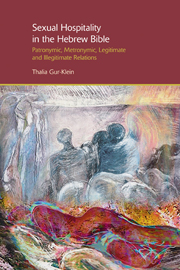 Sexual Hospitality in the Hebrew Bible
Sexual Hospitality in the Hebrew Bible Relating marriage to a spectrum of conjugal patterns problematizes biblical stories. Stories become ambiguous as they represent conjugal patterns that oscillate and intersect one another. However, such texts corroborate the idea that a society itself may practise a number of conjugal patterns side by side and that such coexistence is represented in multifaceted texts. In turn, texts represent a reality which in itself is multilayered and intersected. Resonating with oral tradition and aggregating over centuries, ancient texts themselves culminate as a multilayered corpus. Several systems may exist side by side in one and the same text, incorporating residues of various sources, interweaving them into a story. By inference, systems feature in motifs and are actuated in characters and narrative events, surviving as residual representations of systems. While intersecting and infringing on one another, residual representations of systems intersect, dichotomize, modify and re-modify one another, intertextually complementing, neutralizing and even contradicting one another in texts (on intertextuality, see above).
Biblical texts regarding sexual relations are not necessarily exclusive testimonies of one conjugal form. Resonating with representations which are both multifaceted and fragmented, texts transform marriage and sexual relations into ‘objects charged with contradictions,’ to appropriate Eilberg-Schwartz's words (1992: 18–19). As a corollary, Patai's thesis suggests that the juxtaposition of various systems generates a sense of conflicting imperatives (Patai 1959: 139–45). As each system sets out its objectives, intertextual juxtaposition generates conflicting imperatives and intersection.
To save this book to your Kindle, first ensure no-reply@cambridge.org is added to your Approved Personal Document E-mail List under your Personal Document Settings on the Manage Your Content and Devices page of your Amazon account. Then enter the ‘name’ part of your Kindle email address below. Find out more about saving to your Kindle.
Note you can select to save to either the @free.kindle.com or @kindle.com variations. ‘@free.kindle.com’ emails are free but can only be saved to your device when it is connected to wi-fi. ‘@kindle.com’ emails can be delivered even when you are not connected to wi-fi, but note that service fees apply.
Find out more about the Kindle Personal Document Service.
To save content items to your account, please confirm that you agree to abide by our usage policies. If this is the first time you use this feature, you will be asked to authorise Cambridge Core to connect with your account. Find out more about saving content to Dropbox.
To save content items to your account, please confirm that you agree to abide by our usage policies. If this is the first time you use this feature, you will be asked to authorise Cambridge Core to connect with your account. Find out more about saving content to Google Drive.